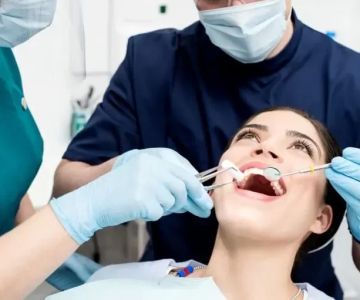What is a Dental Emergency?
A dental emergency is any situation that requires immediate attention to avoid further damage or complications. It could range from severe toothaches and broken teeth to gum bleeding and facial injuries. Not all dental problems are emergencies, but those that involve excessive bleeding, unbearable pain, or structural damage to the teeth or face need urgent care.
Common Dental Emergencies and Their Management
Severe Toothache: Rinse your mouth thoroughly with warm water and use dental floss to remove any trapped food. Apply a cold compress if your mouth is swollen and take over-the-counter pain relievers. See your dentist promptly.
Badly Cracked Tooth: Save and rinse any broken pieces. Rinse your mouth with warm water, apply gauze for bleeding, and a cold compress for pain. Visit your dentist as soon as possible.
Knocked-out Tooth: Retrieve the tooth by holding the crown and rinse the root. If possible, reinsert it into the socket correctly. If not, place it in milk or a saltwater solution and see your dentist quickly.
Extruded (Partially Dislodged) Tooth: Seek dental attention immediately. Use a cold compress and take pain relievers if needed.
Dental Abscess: An abscess is a serious infection that requires immediate treatment. Rinse your mouth with salt water and seek medical help.
Lost or Broken Dental Restoration: Use sugarless gum or dental cement for temporary relief and see your dentist promptly.
Severe Soft Tissue Injury: Rinse your mouth with a saltwater solution, apply pressure with gauze or a tea bag, and hold a cold compress to control bleeding and pain. See your dentist or go to the emergency room if bleeding persists.
When to Seek Emergency Room Care
If your dentist's office is closed and you have severe tooth pain, go to the nearest emergency room. The ER staff can provide medications to alleviate pain and swelling, but they do not perform restorative treatments. You'll still need to see your dentist as soon as they're available.
Dental Emergencies in Children
If a child's baby tooth gets knocked out, apply pressure for bleeding and contact the dentist. For a permanent tooth, rinse it if dirty, try to reinsert it, or keep it moist in milk or saliva and go to the dentist immediately. If a child chips or cracks a tooth, rinse the mouth and take them to the dentist. For a toothache, rinse the mouth and make an appointment if the pain continues. If the dentist isn't available, go to the hospital emergency room.
Prevention Tips
To prevent dental injuries, use mouthguards during sports activities, ensure children are in seatbelts or car seats, childproof your home, have regular dental visits, and follow good oral hygiene protocols. Avoid chewing on hard substances.
Conclusion
In a dental emergency, quick and appropriate action is crucial. Remember to stay calm and follow the steps outlined above. Prompt treatment can prevent further complications and preserve your dental health. Whether it's a severe toothache, a broken tooth, or other dental trauma, knowing what to do can make a significant difference in the outcome. Seek professional dental help as soon as possible to ensure the best recovery.




 Westgate Dental Arts
Westgate Dental Arts Coventry Family Dental
Coventry Family Dental Familia Dental
Familia Dental Dr. Daniel S. Fife, DDS
Dr. Daniel S. Fife, DDS Dentistry At Suburban Square: Michael I. Wollock, DMD
Dentistry At Suburban Square: Michael I. Wollock, DMD Comfort Care Dental
Comfort Care Dental The Importance of Oral Health Education During Pregnancy for a Healthy Pregnancy
The Importance of Oral Health Education During Pregnancy for a Healthy Pregnancy Why Skipping Dental Checkups Can Lead to Bigger Oral Health Problems
Why Skipping Dental Checkups Can Lead to Bigger Oral Health Problems Advantages of Porcelain Dental Restorations
Advantages of Porcelain Dental Restorations Best Tips for Brushing Your Teeth Properly for Healthy Gums: Essential Techniques for Oral Health
Best Tips for Brushing Your Teeth Properly for Healthy Gums: Essential Techniques for Oral Health How Can Diabetes Cause Tooth and Gum Problems? Preventing and Managing Oral Health Issues
How Can Diabetes Cause Tooth and Gum Problems? Preventing and Managing Oral Health Issues Healthy Habits for Promoting Good Oral Health and Hygiene: Tips for a Healthy Smile
Healthy Habits for Promoting Good Oral Health and Hygiene: Tips for a Healthy Smile